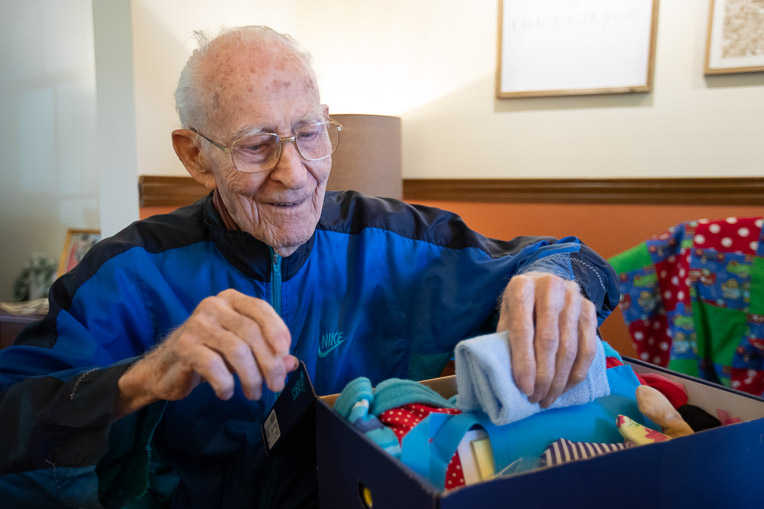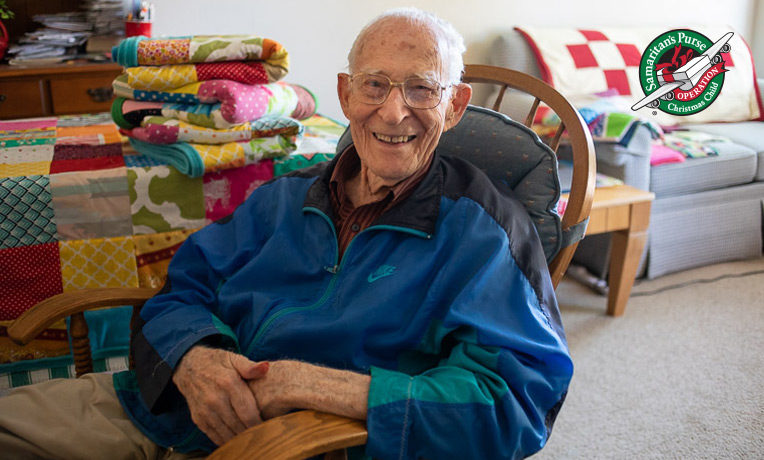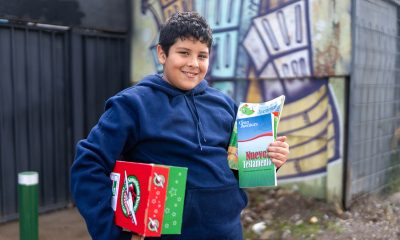Ninety-eight-year-old Theron Jennings taught himself to sew four years ago so he could make blankets for children in need to be delivered through Operation Christmas Child.
Former U.S. Army Staff Sergeant Theron Jennings, 98, lives alone in a Savoy, Illinois, apartment where he sews quilts for children around the world. Since 2014, he has handmade more than 400 of these blankets, completing 160 in just the last year. Each one is lovingly packed into a shoebox gift with other toys and hygiene items and sent across the globe to spread the Good News of Jesus Christ through Samaritan’s Purse Operation Christmas Child project.
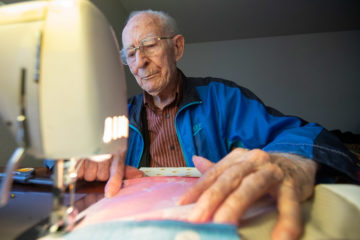
Theron at work on one of the hundreds of quilts he’s made for children around the world.
Theron started this labor of love because he heard a story. His daughter, Debbie Whattoff, read him an article from a Christian magazine about a village in Africa where extremists had killed all the parents, leaving roughly 20 children orphans. He was moved by a woman in a neighboring village who adopted them all. Theron said, “I thought their greatest need was food, but they said we need cover at night.”
Although he’d never sewn a stitch in his life, at age 95, he decided he could do something to help children like them. He taught himself to sew using the machine his family obtained around 1965 and practiced by making quilts for a few of his grandchildren. Then he started on his mission.
Learning that Operation Christmas Child shoebox gifts are sent around the world, including to countries in Africa, he began sewing 4-by-4-foot quilts to put in them.
Theron says he does it to “teach ’em about God. Our hope is that they’ll learn about Jesus.”
All in a Day’s Work for a Family
Theron rises each morning at 4:00 and starts sewing by 6:00. All day long he irons, cuts, arranges, and sews fabric so he can work toward completing one quilt every couple of days.
“I wore out about two to three pairs of pants working on the floor,” Theron said. Yet at 98, he is arthritis-free and can get down on his knees to arrange the quilt squares.
“I try to quit at 5:00 p.m.,” he said. He goes to bed at 6:30 each evening in order to get up and start the process again.
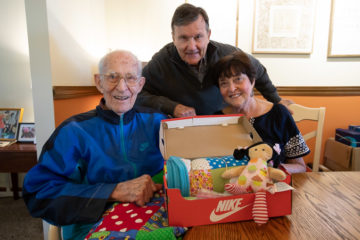
Theron and his daughter and son-in-law, Debbie and Bob Whattoff, can make even quilts fit in shoebox gifts!
“This is his day. This is his world,” said Debbie. “He loves it and it gives him purpose. He feels God has him here up to this age because he is to make quilts for children.”
Debbie hunts for bargains on everything from sheets to cloth napkins that she can bring her dad to cut into six-inch squares. Neighbors also drop off fabric scraps at his door. Together, they keep him from running out of material.
When a quilt is completed, Debbie takes it to her home where her husband Bob rolls it up tight and secures it with rubber bands so it will fit in a shoebox gift for a 2- to 4-year-old girl. Next, they add a doll, crayons, paper, soap, a washcloth, a small bag, and a personal note from Theron to encourage the recipient.
Puedes empacar una cajaWhen Bob and Debbie’s grandchildren are in town, they enjoy helping with the packing and carrying the boxes upstairs to the spare bedroom closet where they are stored until National Collection Week, the third week in November.
“As soon as we turn them in, we start on next year,” Theron said.
Out of 400-plus quilts, Theron is pleased to have received four letters back from recipients in places ranging from Cameroon to Togo, thanking him for his gift.
Trained by Life and War
Theron is motivated to help children in need partly because he grew up in Hillsville, Virginia, during the Great Depression. The middle of seven children, he recalls the “time was short on eatin’.” The Jennings family consumed the potatoes, cabbage, turnips, and sweet corn they grew in their garden year-round. They also raised chickens and turkeys to sell.
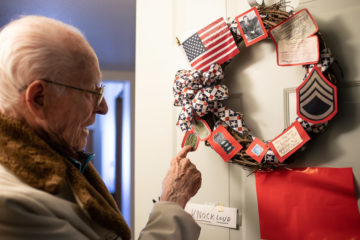
Theron points out a copy of his dog tags on the wreath commemorating his World War II service that hangs on his apartment door.
He remembers watching his mother make dresses out of feed sacks as a 7-year-old—little knowing how it would prove helpful to him as a nonagenarian. He remembered from her example to “always push your thread back so it doesn’t get tangled up.”
Theron married his wife, Grace, in 1941 and while they were still newlyweds, he received a draft notice. Since he was employed at a factory that was making machines for use in the war, Theron’s boss informed him he didn’t have to go. However, Theron said, “I wanted to do my part, so I signed up to go overseas.”
He was stationed in New York City with the military police. To avoid detection from German submarines, he traveled by zigzagging ship to England, Scotland, and Ireland, to pick up prisoners of war and transport them to the United States.
During his military service, he also trained as a mechanic. This provided a job for him when the war ended in 1945, and proved helpful to him as he learned to sew. Today, he fixes his own sewing machine when it breaks down.
‘Jesus Means Everything’
Now a widower, Theron’s hope is that as children receive his quilts in another country, “they’ll see that someone else does care for them.” He said his ultimate desire is to “learn ‘em to be Christian. Jesus means everything. That’s the reason I got into it.”
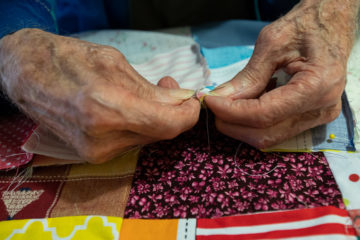
Even at age 98, Theron’s steady hands pin together pieces of a quilt.
He also has a second motivation: “If you keep active, you’ll live longer.”
Debbie sees how her father’s quilting is not only helping others but also breathing life into him. “I have friends with elderly parents who say, ‘If only my parents would do that.’ People at his age are typically watching TV and playing bingo, but he chooses to do this.”
Loretta Auvil, Operation Christmas Child volunteer area coordinator for East Central Illinois, hopes Theron’s story will be an encouragement for others to get involved with the project.
“At 95, he learned a new thing, and at 98, he’s still doing it. Continuing to be a doer ‘til you die is a good thing.”
—
Por los últimos 25 años, Operation Christmas Child, un proyecto de Samaritan's Purse, se ha asociado con iglesias locales en más de 100 países para distribuir regalos a niños necesitados y contarles sobre el mejor regalo de Dios, Jesucristo.
Be a part of blessing children around the world by prayerfully packing shoeboxes full of toys, school supplies, and hygiene items. National Collection Week is coming up, Nov. 12-19!
Learn more about packing a shoebox.
También considera involucrarte en un voluntariado en un centro de procesamiento.
